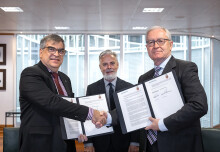

Students from Harris Federation Academies get hands on science and surgery tutorials in Reach Out Lab
See also:
Related news stories:
Thursday 25 November 2010
By Simon Watts
Schoolchildren from seven academies in south London visited the Reach Out Lab at Imperial College London this week for an inspirational evening of science master classes led by Lord Robert Winston.
Over the two evening events forty eight pupils from Harris Federation Academies in areas including Crystal Palace, Bermondsey and East Dulwich were given the opportunity to get hands-on experience of science and medicine in action. In a surgery simulation inside an inflatable operating theatre, they donned full surgical kit to work alongside Dr Roger Kneebone, Reader in Surgical Education at Imperial, and his medical team, to stem the flow of blood from a knife wound on a life-sized prosthetic dummy. They also participated in a workshop to remove lesions from prosthetic limbs and a rat dissection masterclass led by Professor Winston. One event was targeted at pupils aged 16 and over, whilst the other was aimed at younger students.
Inspiring science teachers as much as pupils
Events such as these, suggested Lord Winston, Professor of Science and Society at Imperial College London, are a necessity to redress the relative failure of science teaching in our schools. “Science education in schools is not achieving sufficient success – almost 30% of schools don’t even have science labs,” he said. “We need to inspire science teachers as much as the pupils, and too long is spent on teaching theory these days. Whilst many science teachers are constrained by the curriculum, we need to give them the opportunity to inspire their students through practical experiments.”
Shona Findlay, consultant leader for Science at the Harris Federation, said: “The events gave our students the opportunity to experience what it might be like to come to university and become a medical student. They are all of very high ability and have an interest in medicine. We are hoping to encourage more of them to apply as we haven’t yet had anyone go to medical school. It has also been a great opportunity for the teachers in terms of their professional development.”
Student Tajwar Rahman from Harris Boys’ Academy East Dulwich said: “It’s been very useful and I’ve really enjoyed it. I’ve been thinking about surgery and this has definitely inspired me.” Pedro Silva, from the Harris City Academy Crystal Palace said after experiencing the simulated surgery: “I was planning to study medicine and I was thinking of specialising in psychiatry. Now I’m not sure whether I want to go into surgery instead.”
Relevant experience for medical school
These events provide the invaluable practical experience that students wishing to apply to medical school need.“Applications to medicine in higher education are massively oversubscribed but more students need to be recruited from less privileged backgrounds,” said Professor Winston. “Roger Kneebone’s activity provides a new stepping-stone that will help more students in the application process.”
Eileen Dye, a teacher at Harris City Academy Crystal Palace, agreed: “This is an experience that the students can talk about in interviews, and hopefully it will spur them on.”
Professor Winston established the Reach Out Lab at Imperial College London to inspire children of all ages about science. Formally opened in March this year, it provides a high tech, multi-disciplinary space where they can get practical experience of science, participating in activities and experiments that many state schools would be unable to organise. Pupils are guided through experiments in the five key STEM (Science, Technology, Engineering and Mathematics) areas: physics, chemistry, mathematics, biology and engineering, supporting the requirements of the National Curriculum for science teaching.
Imperial students are encouraged to get involved as Lab mentors, to gain experience which is helping to shape career paths for some. “We have seen first-hand that involvement with the Lab can change attitudes, with many going on to consider teaching as a career,” Professor Winston added.
Professor Winston’s hope is that other universities may be encouraged to follow the Reach Out Lab’s model, and build links with their local schools in communities right across Britain. He says: “This type of initiative is fundamental to the future success of science and innovation in the UK. The government has rightly protected the science budget – now we need to make certain we are ensuring widespread science literacy and helping to produce the next generation of scientists alongside this.”
 Slideshow requires Javascript and Flash 9
Slideshow requires Javascript and Flash 9Article text (excluding photos or graphics) available under an Attribution-NonCommercial-ShareAlike Creative Commons license.
Photos and graphics subject to third party copyright used with permission or © Imperial College London.




